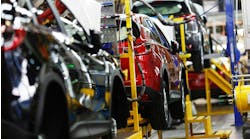AI Q&A: A chat with pros promoting the adoption of artificial intelligence in industrial automation
The Association for Advancing Automation (A3) has created a new Artificial Intelligence (AI) Technology Strategy Board of leading AI experts, part of an initiative to promote education and adoption of the applications of artificial intelligence in automation industries. We wanted to learn more, so we posed questions to a few stakeholders. Take a look…
Smart Industry: What is the A3? What are its goals?
Jeff Burnstein, A3 president: The A3 is the global advocate for the benefits of automating. We are North America’s largest automation trade association representing more than 1,100 organizations involved in robotics, artificial intelligence, machine vision & imaging, motion control & motors, and related automation technologies. Previously, we were known by our daughter associations, the Robotic Industries Association, AIA—Advancing Vision + Imaging, and the Motion Control & Motors Association. But this year, we merged into a single association with a new website AUTOMATE.ORG that serves as a guide to using automation technologies.
Since our founding in 1974 as a robotics association, we have become the trusted resource for companies looking for valuable resources on how to automate successfully. We host the Automate Show in Detroit, Michigan, and The Vision Show, in Boston, Massachusetts. We collect industry statistics and generate market research, develop consensus standards in robotics and vision, provide professional certification programs, host webinars and podcasts, and engage in a wide variety of other educational activities. We are the voice of the automation industry to policy makers, the news media, and the general public, advocating on behalf of our members throughout the world.
Smart Industry: What are the missions of new board members?
Burnstein: Guided by this new AI strategy board, the association seeks to provide clear, actionable guidance on deploying artificial intelligence in automation in ways that realize value. We will connect potential users of AI with enablers of the technology, while providing clear guidance on what’s real today versus what’s still off in the future. The association has already begun work on industry-recognized AI professional certifications. And we want to help companies train and recruit the AI-ready workforce of the future.
Smart Industry: What are the unique opportunities/challenges with AI in the industrial-automation space?
John Lizzi, executive leader-robotics at GE Research: The opportunities are vast. AI is slowly becoming a part of our everyday lives and we see it touching many parts of industry in the coming years as well; from manufacturing to logistics, field service to customer delivery. Inspection, picking, and autonomous navigation are just a few areas where we see great, real-world applications and many more opportunities.
There are absolutely challenges, as well. For example, certain AI techniques like machine learning (ML) are non-deterministic in nature, that is, an input doesn’t always map to the same output, and that breaks down some traditional safety assurance techniques. When dealing with mission-critical or safety-critical applications, it’s therefore imperative that this is taken into account as we build trusted AI systems.
Smart Industry: How is the use of AI changing as a result of the pandemic?
Lizzi: We don’t see it changing as much as we see its use being accelerated by some of the challenges COVID has presented. COVID is a watershed moment for a wide range of technologies, AI included, and we’re seeing more and more players now either jumping in to start their AI journey or amplifying the investment they’ve been making.
Smart Industry: Do we still need to educate industrial leaders about the value of AI?
Lizzi: Absolutely. AI presents a major opportunity for industrial players but there’s also a tremendous amount of hype out there—the term “AI” itself is being thrown around quite a bit and it can be extremely confusing to understand what’s going on in the space. Industrial leaders need support in helping to separate the hype from reality and need guidance in connecting the right AI-based technology to the right value streams and application spaces. We believe A3 plays an important role in this as a trusted information source and relationship broker for real-world AI for the automation industry.
Smart Industry: What most excites you about the near future of AI in the industrial space?
Lizzi: It’s really getting down to brass-tack application of the technology. We interact with AI daily in our personal lives and it’s been deployed in many industrial applications over the years, but we’re just scratching the surface. Over the last 10 years, the tools, frameworks and computation has matured to the point of rapid adoption and we believe that’s what you’re going to see over the next few years in industry.



